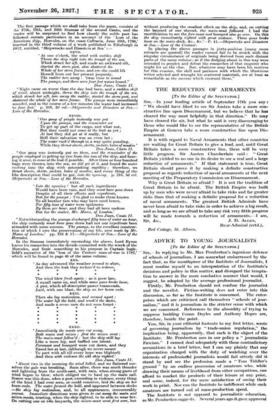THE REDUCTION OF ARMAMENTS [To the Editor of the SPECTATOR.]
Sts,—In your leading article of September 17th you say : " We should have liked to see Sir Ansten take' a more con- structive line upon Disarmament, but we believe that he has cleared the way most helpfully in that direction." He may have cleared the air, but what he said is very discouraging to those who would like to see the representative of the British Empire at Geneva take a more constructive line upon Dis- armament.
It is with regard to Naval Armaments that other countries are waiting for Great Britain to give a lead, and, until Great Britain takes a more constructive line, there will be very little progress. Sir Austen Chamberlain said : " Great Britain yielded to no one in its desire to see areal and a large reduction of armaments." If that statement is true, Great Britain should prove it by making a definite constructive proposal as regards reduction of naval armaments at the next meeting of the Preparatory Commission on Disarmament.
Why is Great Britain so afraid ? It is not the tradition of Great Britain to be afraid. The British Empire was built up by men who were never afraid to take risks and far greater rill than that of making a definite proposal for a reduction of naval armaments. The greatest British Admirals have never been afraid to take risks in order to achieve a big result, and as long as we are afraid to take any risk very little progress will be made towards a reduction of armaments.—I am, Rear-Admiral (retd.).
Red Cottage, St. Albans.






















































 Previous page
Previous page